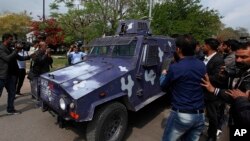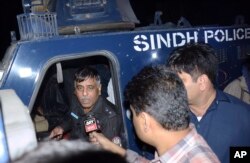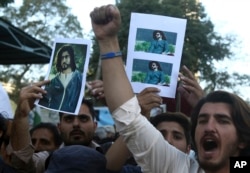A Pakistani police officer, allegedly responsible for ordering more than 400 extrajudicial killings, is in custody after turning himself in to the country's Supreme Court in Islamabad.
Rao Anwar had been wanted since January, after he was implicated in a phony police encounter that led to the killing in Karachi of a 27-year-old Pashtun man, Naqeebullah Mehsud.
Anwar once tried to flee the country, but was stopped in Islamabad's airport before being allowed to leave.
Since then, Anwar has been hiding from law enforcement agencies while phoning journalists on the WhatsApp messenger service to give interviews and writing letters to Pakistan's Supreme Court to claim his innocence. He remained at large even after authorities ordered all law enforcement agencies, including those from the country's intelligence services, to help capture him.
Anwar's brazen attitude, in part, helped turn a protest over Mehsud's killing into a wider political movement for the rights of the country's ethnic Pashtuns, particularly those living in Pakistan's troubled tribal region where Mehsud was from.
The Federally Administered Tribal Areas, or FATA, near the border with Afghanistan became the frontline in the war against terror and militancy ever since the United States and its allies invaded Afghanistan in 2001. Al-Qaida, Taliban and other militant groups took refuge there when they fled Afghanistan.
The areas, once considered a buffer between British India and Russia, are still governed under British colonial-era regulations, leaving the local population without access to many fundamental rights or the country's judicial or policing systems.
Locals suffered violence at the hands of militants or faced government action targeting the militants, including military operations that destroyed homes and forced thousands to flee. The military claims it has cleared the areas of militants, and many residents have since returned.
Mehsud had migrated to Karachi, the country's largest city and economic hub, in search of better economic opportunities.
The local Pashtun population also complained of harassment at security checkpoints, frequent curfews, and ethnic profiling, which they said resulted in intelligence agencies picking up Pashtuns for interrogation in the name of curbing militancy. Pashtun settlers in Karachi have frequently voiced similar complaints.
Demonstrations, demands
The protest movement resulted in a 10-day sit-in in February in Pakistan's capital, Islamabad, in which thousands of Pashtuns from around the country participated. They submitted a list of demands that included calls to investigate all cases of extrajudicial killings of Pashtuns. Additionally, they wanted victims of enforced disappearances to be returned, and they called for land mines to be cleared from their areas, saying the devices frequently killed or maimed locals.
"Our demands are constitutional and our movement peaceful," said Manzoor Pashteen, a young leader of the movement.
The sit-in ended when the government promised to fulfill their demands; however, the lack of implementation, particularly in the case of arresting Rao Anwar, led to follow-up demonstrations in various cities.
After Anwar's appearance and subsequent arrest, Mehsud's father expressed confidence in the court's proceedings.
Saif ur Rehman, another leader in the movement, said they intended to remain peaceful.
"During our sit-ins in Islamabad and Karachi, there was not a single incident of damage to properties. We were seeking justice from the courts and it seems that is happening now."








